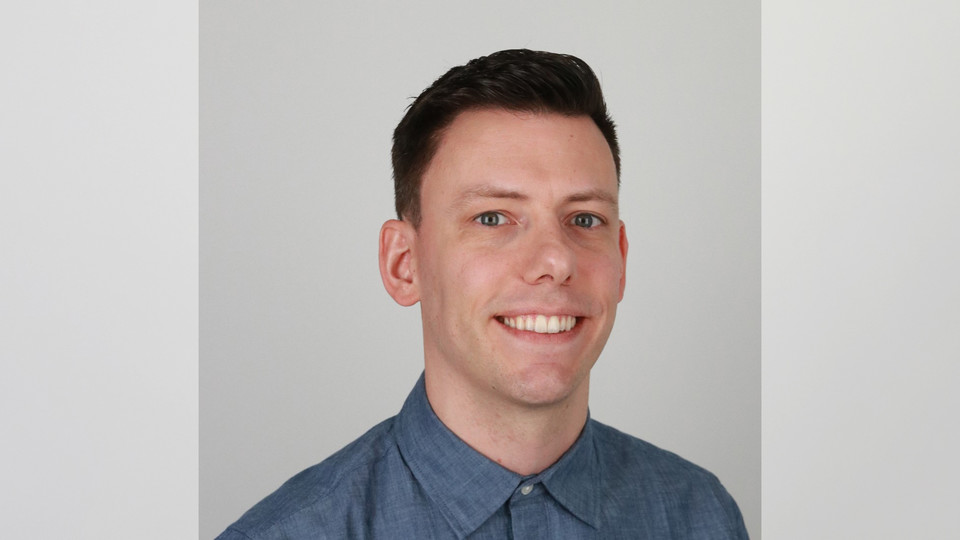Top 50 Graduate Entrepreneurship Programs
Rice Business takes the #1 spot again in the Princeton Review’s ranking list of the top 50 graduate programs for entrepreneurship education.

Two Houston universities’ entrepreneurship programs rank No.1 in Princeton Review
The University of Houston and Rice University both ranked No.1 in the Princeton Review for their entrepreneurship programs for undergraduate and graduate levels respectively. This marks the second consecutive year the two Houston universities have topped the list of entrepreneurship programs.
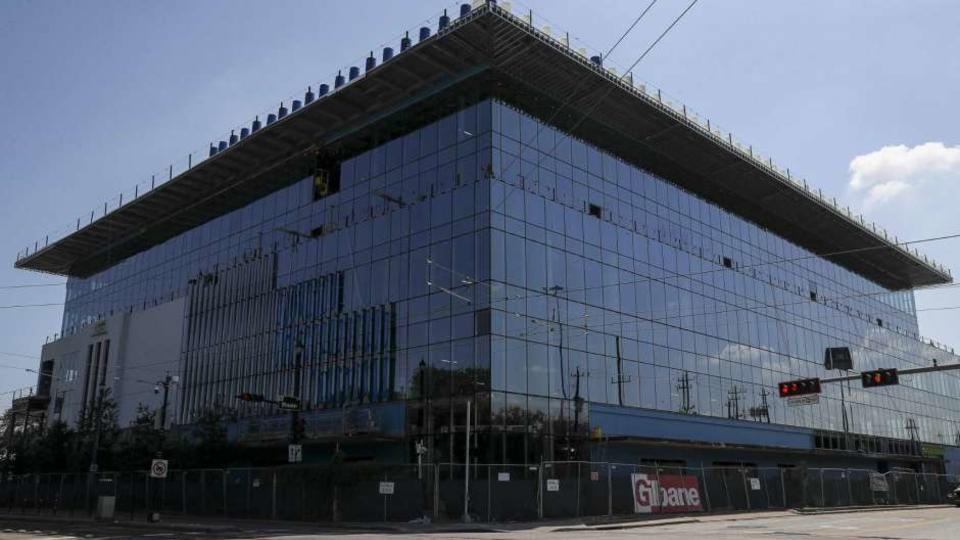
Rice salutes its veterans in annual ceremony
The 18th annual Veterans Day ceremony Nov. 11 honored three veterans and one active-duty service member among the Rice community, including Matthew Manriquez, Full-Time MBA Class of 2021, who served in the Army.
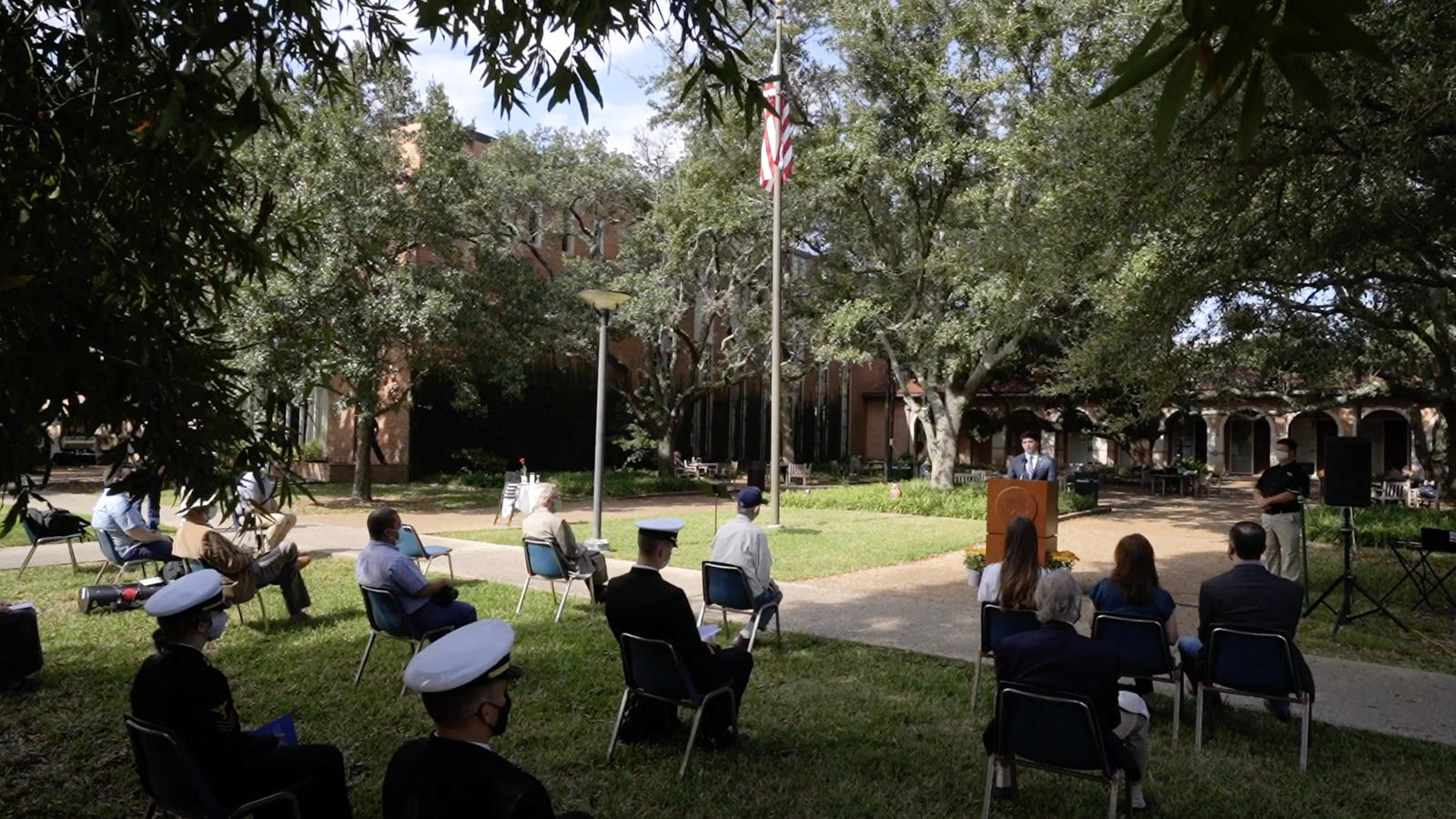
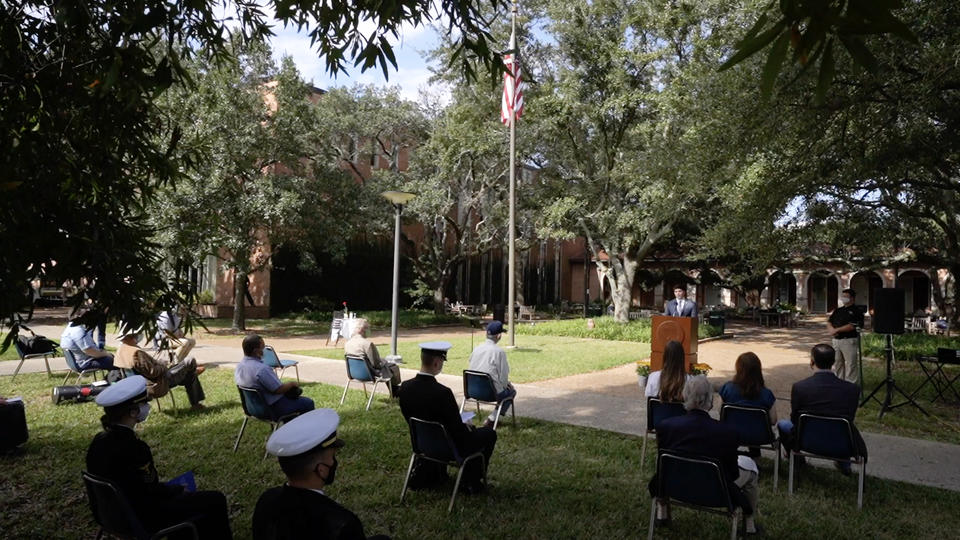
The 18th annual Veterans Day ceremony Nov. 11 honored three veterans and one active-duty service member among the Rice community: Terry Graham, manager of learning spaces in the Office of Information Technology, who served in the Marines; alumnus William Pannill ’62, who served in the Army Reserve and Marines; Matthew Manriquez, a student in the Jones Graduate School of Business who served in the Army; and Jones College senior Charlie Wannall, a midshipman in the Naval Reserve Officers Training Corps.
The full ceremony, which took place on the Central Quad outside the Rice Memorial Center, can be viewed online at Rice’s YouTube page.
You May Also Like

Rice University’s Jesse H. Jones Graduate School of Business today announced the launch of its Graduate Certificate in Healthcare Management program, a 10-month, credit-bearing professional credential designed for current and aspiring leaders seeking deep expertise in the business of healthcare.
Houston companies awarded top honors at premier life science venture capital conference
Life science investors, leaders and innovators from around the world gathered virtually to discuss the pandemic, medical technology and the future of the industry at the Texas Life Science Forum, where Houston companies claimed top honors.


Life science investors, leaders and innovators from around the world gathered virtually to discuss the pandemic, medical technology and the future of the industry at the Texas Life Science Forum, where Houston companies claimed top honors.
The forum, co-hosted by BioHouston and the Rice Alliance for Technology and Entrepreneurship, is one of the premier life science venture capital conferences in the U.S. It featured pitches by 40 companies developing innovative solutions in medical devices, digital health, diagnostics, pharmaceuticals and therapeutics. The presenting companies — about half of which are Houston-based — have already raised more than $275 million in funding.
Starling Medical won the Michael E. DeBakey Memorial Life Science Award, established by BioHouston in honor of the groundbreaking Houston cardiovascular surgeon. The Houston digital health device company is revolutionizing severe bladder dysfunction management with artificial intelligence.
Ten other entries were chosen by investors as the Rice Alliance Most Promising Life Science Companies, presented by the Greater Houston Partnership. They are:
- Droice Labs, New York, is an AI/big data company that helps match patients to therapies by delivering personalized medicine at scale.
- SFA Therapeutics, Jenkintown, Pennsylvania, is developing oral drugs for treating conditions of chronic inflammation that have the potential to change the practice of medicine.
- Hummingbird Bioscience, Houston, pursues challenging targets that play a key role in disease yet have not been effectively drugged; its work includes 12 therapies in various stages of development, four of which have the potential to revolutionize their fields.
- CaseCTRL, Houston, is a management platform for surgeons, providing software-as-a-service technology that uses AI and logistics to lower operational costs and simplify surgical planning.
- Perimeter Medical, Dallas, is driven to transform cancer surgery with advanced, real-time, ultrahigh-resolution imaging tools including AI to address areas of unmet medical need.
- Studio Bahia, San Antonio, provides an accessible model for therapy in addressing mental health crises from the pandemic.
- Tvardi Therapeutics, Houston, is a clinical-stage biopharmaceutical company focused on the development of small molecule, STAT3 inhibitors.
- Koda Health, Houston, uses AI to help guide difficult conversations in health care, starting with end-of-life care planning.
- ImmunoGenesis, Houston, is a clinical-stage biotechnology company developing therapeutics to catalyze effective immune responses in immunologically “cold” cancers such as prostate, colorectal and pancreatic.
- Ictero Medical, Houston, is developing the first minimally invasive cryoablation solution to treat patients with gallstone disease.
Financial support for the forum was supported by the Texas Medical Center and Insperity.
You May Also Like

Rice University’s Jesse H. Jones Graduate School of Business today announced the launch of its Graduate Certificate in Healthcare Management program, a 10-month, credit-bearing professional credential designed for current and aspiring leaders seeking deep expertise in the business of healthcare.
Rachel Garforth-Bles
“Artist and entrepreneur. Motivator and Collaborator. Excited about building community, creating compelling narratives, and Tex-Mex.”
Full-Time MBA Rachel Garforth-Bles's interview was first shared on Poets&Quants. Check out her advice and Rice Business admissions journey.
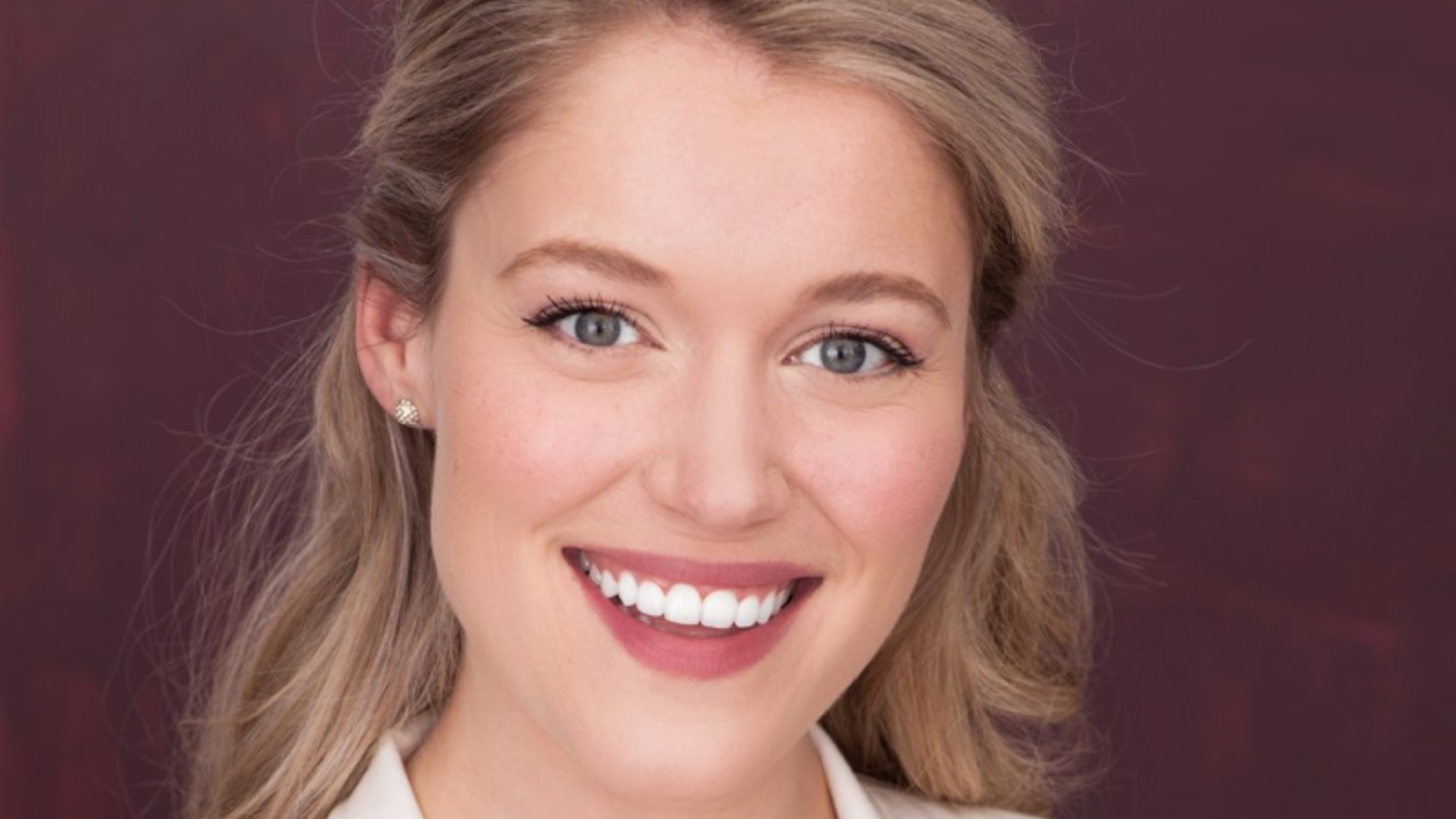
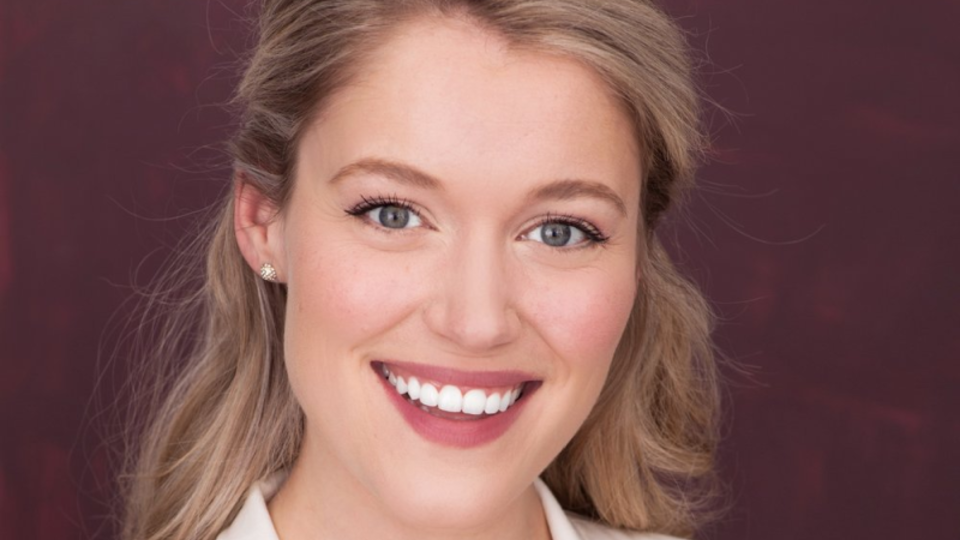
“Artist and entrepreneur. Motivator and Collaborator. Excited about building community, creating compelling narratives, and Tex-Mex.”
Hometown: Sherman, TX
Fun Fact About Yourself: I played Glinda the Good Witch in the Broadway National Tour of Andrew Lloyd Webber’s The Wizard of Oz. We traveled all over North America and performed eight times a week! Job highlights included flying from the rafters into Munchkinland, exploring new cities every week, and chatting with kids at the stage door.
Undergraduate School and Major: Rice University, Vocal Performance
Most Recent Employer and Job Title: I just wrapped a movie for The Hallmark Channel. It certainly wasn’t your typical last role prior to beginning an MBA, but it was a great send off into a new adventure.
Aside from your classmates, what was the key part of the school’s MBA programming that led you to choose this business school and why was it so important to you? I am what is fondly known as a Rice Twicer. I attended Rice as an undergrad, and when I decided to pursue my MBA, Rice was at the top of my list. I think that the combination of exceptional academics and focus on maintaining a supportive and kind community is what makes Rice so unique compared to other peer schools. I wanted a program where asking questions is encouraged, and succeeding is a collaborative undertaking. I knew from experience that Rice was that kind of place.
What club or activity excites you most at this school? During my first conversation with the Rice Admissions team I learned about the Board Fellows program. It is a program that matches current MBA students with local non-profits, and allows them to serve as board members. When I worked in the arts, I saw the amount of man-power it takes to sustain non-profits, and I wanted to help! I never imagined myself having the power to impact organizations at the board level, and I am thrilled at the thought of what is possible. I also have recently begun playing golf (after a very lucky purchase of some great clubs on Facebook Marketplace for $20), and I hope to pick-up a few pointers from my fellow classmates in the Golf Club.
What makes you most excited about getting your MBA at Rice? What makes you most nervous about starting business school? The thing that excites me most about pursuing an MBA is also what makes me most nervous. I am embarking on a completely new chapter of my life and career by transitioning from the performing arts into the business world. I am confident that Rice is the kind of place that can support a shift of this magnitude, and I look forward to getting started!
Describe your biggest accomplishment in your career so far: My favorite career accomplishment was the first time I went behind the camera, and created a project from start-to-finish. I worked with a small team to create, write, produce, and perform in a web series designed for Instagram. (This was before IGTV, and it was one of the first scripted series created for the platform.) The inspiration for the show came from our own experiences trying to break into the entertainment business. It explored the idea that appearances aren’t always what they seem, especially on social media.
Soon, what began as a purely artistic endeavor turned into a crash course in social media marketing and brand management. We aggregated 10,000+ followers in under eight months, and received hundreds of messages from young women who were inspired by our story.
It was very fulfilling to grow something from nothing, and to see the impact it had on people’s lives. Authentic story-telling and a willingness to adapt were the hallmarks of our success, and I am proud of the community we were able to build in such a short time.
What led you to pursue an MBA at this point in your career? In the last few years, I started exploring my skills outside of the performing arts. The experience of building a brand around my web series was the first of these explorations. I also co-founded a distribution company, and began importing fine spirits to Canada. These first ventures into entrepreneurship were exciting and gave me confidence in my current skill set. However, they also showed me where I had room to grow, and made me want to learn more. When I realized I was more excited about my entrepreneurial efforts than my next acting gig, I knew I was ready to focus my attention on business full time.
What other MBA programs did you apply to? UT Dallas, UT McCombs, Vanderbilt (but I knew Rice was the place for me!)
What was the most challenging question you were asked during the admissions process? It was challenging for me to reframe my experience as an artist into something that was relevant to business school. Fortunately, Rice connected me to a current MBA student from a similar background who generously helped me navigate the process (“Rice is nice” is not just a saying!). Overall, I found that the admissions process encouraged me to dig deeper into why I wanted my career to change, in what ways, and how I was going to make it happen. The questions asked in the interviews and on the applications helped me to define my goals, and gave me a lot of clarity moving forward.
What have you been doing to prepare yourself for business school? I have been working through several Coursera courses on Excel and Finance. I have also reached out to people in my network who have strong careers in business, especially those in my desired post-graduate industry. Given my background in the arts, I am working to learn as much as possible about different industries and careers prior to beginning the program.
What was your defining moment and how did it prepare you for business school? One of the most defining moments of my life was when I left the small, Texas town I grew up in to attend Interlochen, an arts boarding school in Michigan. My classmates were diverse and eclectic, and we all came together in this tiny, remote place to practice, study, and be immersed in our chosen art form. It was an immense period of growth for me, and an experience that changed the course of my life. The courage to seek out new opportunities, ability to adapt to new circumstances, and focus on building strong relationships were a few of the skills I developed at Interlochen that I hope will continue to serve me at business school.
What is the most important attribute that you are seeking in an MBA employer? Why? I hope to work for a company that prioritizes people. During the current pandemic, it has been enlightening to see how different companies have interacted with their employees and customers. I want to be proud of the company I work for. I also want to feel confident that, while they are successful as a business, they aren’t doing it at the expense of their communities, customers, or employees.
Pretend you have just graduated from business school. What will you need to have done to make your experience successful? Being a full-time student is an amazing opportunity to take stock of your life, skills, and career, and decide what comes next. I hope to take advantage of this time, and enthusiastically explore every opportunity that presents itself. When I am finished with my degree, I want to have investigated every option, talked to everyone I can find, and found a new role that values the combination of creativity and technical skills I will have developed as an artist and an MBA graduate.
Justin Rose
“Growth-minded leader, committed to helping people and organizations in creating solutions to tomorrow’s challenges.”
Full-Time MBA Justin Rose's interview was first shared on Poets&Quants. Check out her advice and Rice Business admissions journey.
“Growth-minded leader, committed to helping people and organizations in creating solutions to tomorrow’s challenges.”
Hometown: Houston, TX
Fun Fact About Yourself: I love experiencing other cultures. I’ve visited 13 countries throughout Africa, Asia, and Europe, including the Running of the Bulls in Pamplona.
Undergraduate School and Major: Texas Christian University ‘12, B.S. Political Science
Most Recent Employer and Job Title: Houston Independent School District, Program Administrator
Aside from your classmates, what. was the key part of the school’s MBA programming that led you to choose this business school and why was it so important to you? Rice has the #1 Graduate Entrepreneurship program in the country and is internationally recognized for producing talented entrepreneurs. For example, the Rice Business Plan Competition (the richest and largest of its kind) is just one of the unique opportunities Rice Business creates to maximize its MBA’s growth. I look forward to being a part of the next generation of entrepreneurs to improve the way we live and work, our standards of living, and to create social change.
What club or activity excites you most at this school? Rice Business Board Fellows is another opportunity that really made Rice standout in my eyes. The opportunity to give back and gain experience at the board level is something I will pursue throughout my career and the ability to start while pursuing my MBA is exciting!
What makes you most excited about getting your MBA at Rice? What makes you most nervous about starting business school? Besides the privilege of attending one of the premier institutions in the country, I value Rice’s small class size because it allows MBA students to build strong relationships with classmates. As the saying goes, “it’s not what you know, it’s who…”
As far as what makes me most nervous, I think COVID-19 has disrupted all our lives in some capacity. That unknown probably brings about the most anxiety for me, but focusing on the things I can control has helped a lot!
Describe your biggest accomplishment in your career so far: My biggest accomplishment has probably been leading the Urban Leaders Fellowship in Denver. I fundraised and negotiated $60k in funding and led 30 mid-career professionals through a seven-week fellowship focused on community organizing and leadership at non-profit organizations.
What led you to pursue an MBA at this point in your career? After eight years in education I was ready to take my career to the next level. Experiences like leading the Urban Leaders Fellowship and learning how our partner organizations were doing powerful work in communities allowed me to see business as an impactful pathway.
I knew grad school was in my future, but guidance from MBA alums and organizations like The Consortium helped make the pathway of business education a reality.
What other MBA programs did you apply to? McCombs School of Business – University of Texas at Austin
What was the most challenging question you were asked during the admissions process? The “Tell me about yourself” question was so important for me to refine as a “non-traditional” business school applicant. It took a couple of iterations to translate my education, political, and the non-profit experience in ways that highlighted my transferable skills adequately.
What have you been doing to prepare yourself for business school? As a Consortium Fellow, I had the opportunity to attend a diversity recruiting conference with some of my classmates, which was a great opportunity to meet, learn, and even interview with some top-tier companies. Our Career Development Office at Rice was so supportive before, during, and after the conference which just confirmed why I chose Rice.
I also spent a lot of time reaching out to current and former MBA students and business leaders to better understand their experience in business school and explore different business functions and industries.
Finally, I spent some time on MBAMath.com to brush up on business related quant skills.
What was your defining moment and how did it prepare you for business school? One of my defining moments was immediately after undergrad when I committed to serve as an educator in low income communities through Teach for America.
The five years I spent in the classroom prepared me for business school by grounding my professional experience in a fast-paced, high-stakes, relationships-first environment. I look forward to applying the interpersonal communication and organizational development skills I learned in education to the business world.
What is the most important attribute that you are seeking in an MBA employer? Why? Professional growth through opportunity and mentorship. I want to work for an organization that prioritizes challenges and is committed to my growth as well. As I think about the long-term trajectory of my career, opportunities to grow professionally excite me and also bring out my best work.
Pretend you have just graduated from business school. What will you need to have done to make your experience successful? I have found that the most effective way to approach big daunting challenges is to lean in and embrace the climb. Specifically, for business school, this approach will require leveraging the many resources Rice provides to MBA candidates.
Also, I have taken a big step outside of my comfort zone. This means embracing my weaknesses and seeking out challenges that address these areas before I arrive at my post-MBA employer.
Takeya Green
“Bold. Determined. Vibrant. And a whole lot of sass!”
Full-Time MBA Takeya Green's interview was first shared on Poets&Quants. Check out her advice and Rice Business admissions journey.
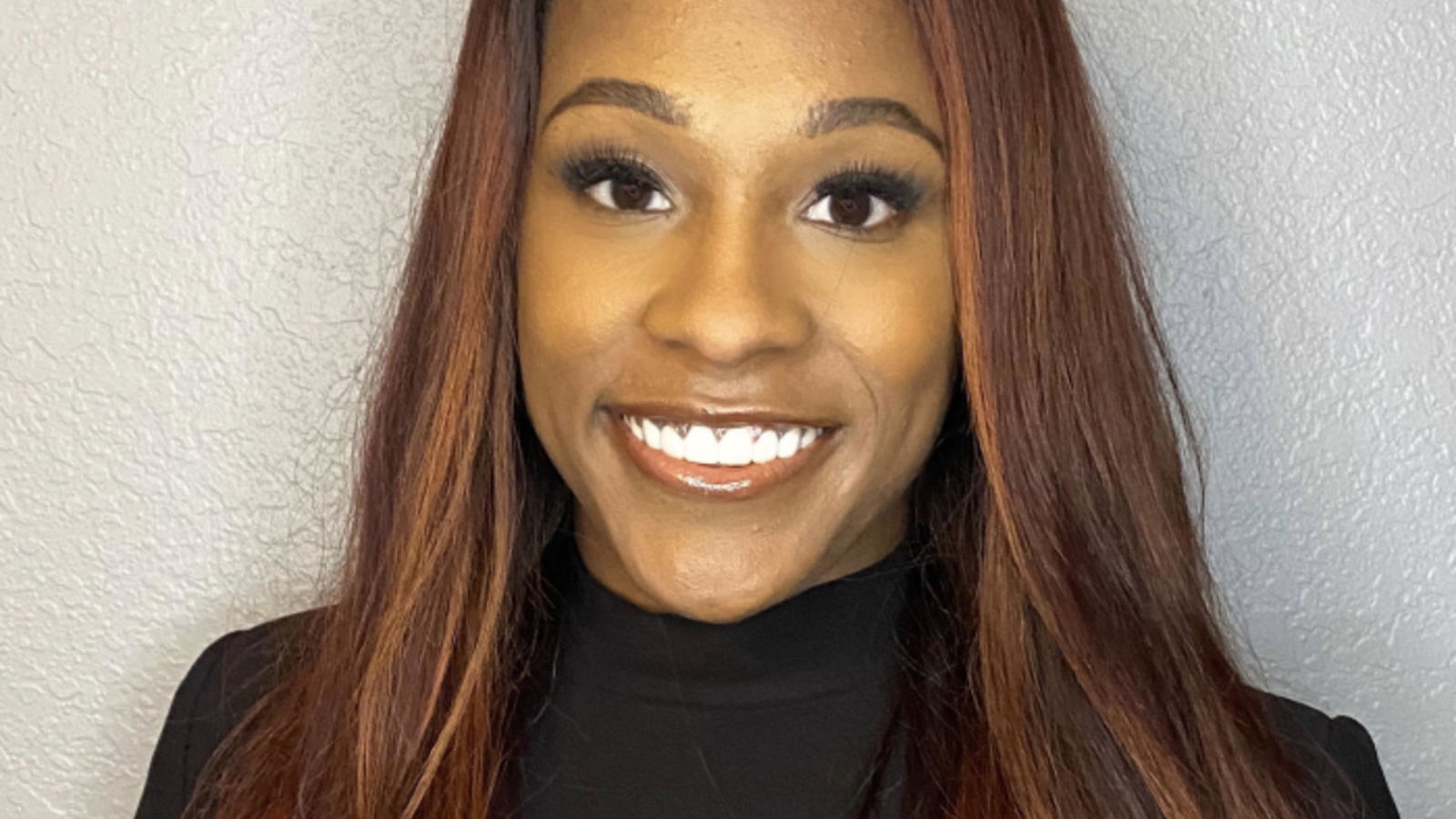
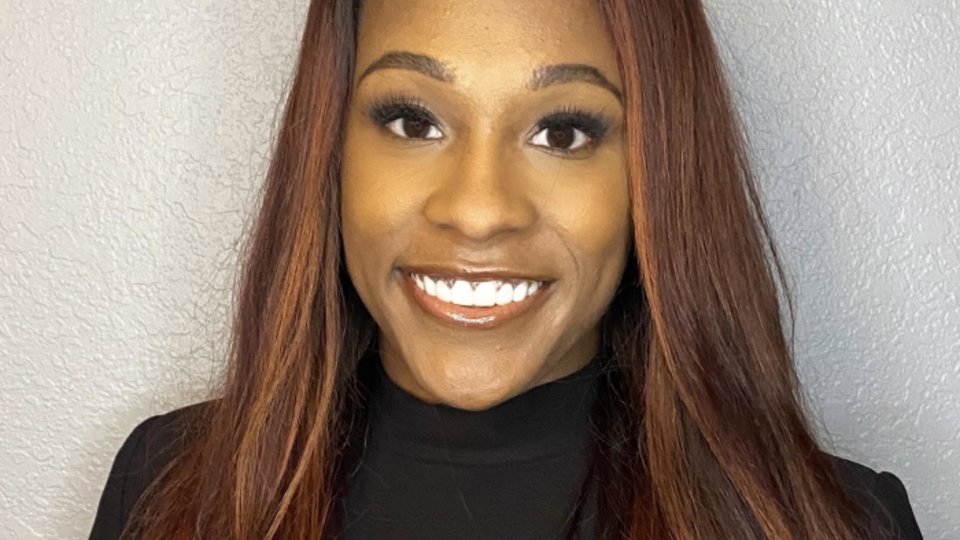
“Bold. Determined. Vibrant. And a whole lot of sass!”
Hometown: Chicago, IL
Fun Fact About Yourself: I am a retired NFL cheerleader for the Houston Texans. It was one of the most exhilarating experiences in my life. I got to meet and dance for musical artists such as Flo Rida and Big Boi from Outkast and always had the best view of all the home games, field side view!
Undergraduate School and Major: University of Illinois at Urbana-Champaign, Chemical Engineering
Most Recent Employer and Job Title: Dow Chemical, Senior Production Engineer
Aside from your classmates, what was the key part of the school’s MBA programming that led you to choose this business school and why was it so important to you? I was looking for a school that had a more intimate setting. Coming from a big public university, I did not want to be in class with hundreds of students. I wanted to be in a small intimate place where I could get that 0ne-on-one learning to ensure I was prepared to go into the business world.
What club or activity excites you most at this school? I am most excited for board fellows. I think it is a unique opportunity to sit on a board of directors for nonprofit organizations in Houston. I love Houston as a city, and I could not think of anything more exciting than to see what happens behind the scenes of big organizations aimed at helping the city.
What makes you most excited about getting your MBA at Rice? What makes you most nervous about starting business school? + I am excited simply to be starting over. I was 17 when I chose engineering and with the experiences I have now, I am excited to choose a career path that I can fully see as long term.
I am most nervous to go back to a college student budget. It has been six years since I left that lifestyle, so going back will be a BIG adjustment.
Describe your biggest accomplishment in your career so far: My biggest accomplishment in my career is getting recognized by the C-Suite of my company for a project I worked on. After the installation of my project, my company immediately realized 1Mil+ in annual profits.
What led you to pursue an MBA at this point in your career? I wanted to be in the room when companies are making strategic decisions. As an engineer, you are always at the mercy of the business. Every dollar you receive and every change you want to make must be within the strategic deliverables the business demands. I want and will get a seat at that table.
What other MBA programs did you apply to? Chicago Booth, UT Austin – McCombs , Texas A&M
What was the most challenging question you were asked during the admissions process? I was asked what I would contribute to an MBA program. I think this question gets asked in some shape, form, or fashion for any part of an MBA application process. It was a challenge because I have yet to master the art of the humble brag.
What have you been doing to prepare yourself for business school? I have been taking classes in finance and accounting and making meaningful connections with classmates and employers. I wanted a jump start on the things I felt would ensure my success as an MBA student.
What was your defining moment and how did it prepare you for business school? My defining moment was when I was chosen to become an NFL cheerleader. I had auditioned multiple times and the year I made it, was the year I stopped trying to portray myself the way I thought I had to in order to make the team. I was 100% original and it was noticed by my coach. She chose me because I was unique to the others I performed against. This prepared me for business school because throughout my application process, I was 100% myself. It is easy to put on a façade when you really want that job or an acceptance letter from a specific school. However, I believe you find your true fit or true happiness when you are 100% yourself in the process.
What is the most important attribute that you are seeking in an MBA employer? Why?T he most important attribute I want to see is humanitarianism. Our country has some work to do regarding equality and opportunity for all. I want to be at a corporation that acknowledges their failures in that area and takes action to go in the right direction. I am looking for progress, not perfection.
Pretend you have just graduated from business school. What will you need to have done to make your experience successful? To make my experience successful, I will have done three main things: excelled academically, made life longs friendships, and received my full-time offer in investment banking.
Exclusive: HX names finalists for inaugural Houston innovation awards
Ever wonder what Houston startups and innovators are the best of the best? Here's your chance to figure it out. The inaugural Listies awards program has named its finalists.

Employers Warm to Online MBAs in Coronavirus Pandemic
“As more business schools with strong brand reputations, selective admissions and rigorous curriculums launch degrees, the reputation of Online MBA programs will continue to rise," said Phil Heavilin, executive director of the Career Development Office at Rice Business
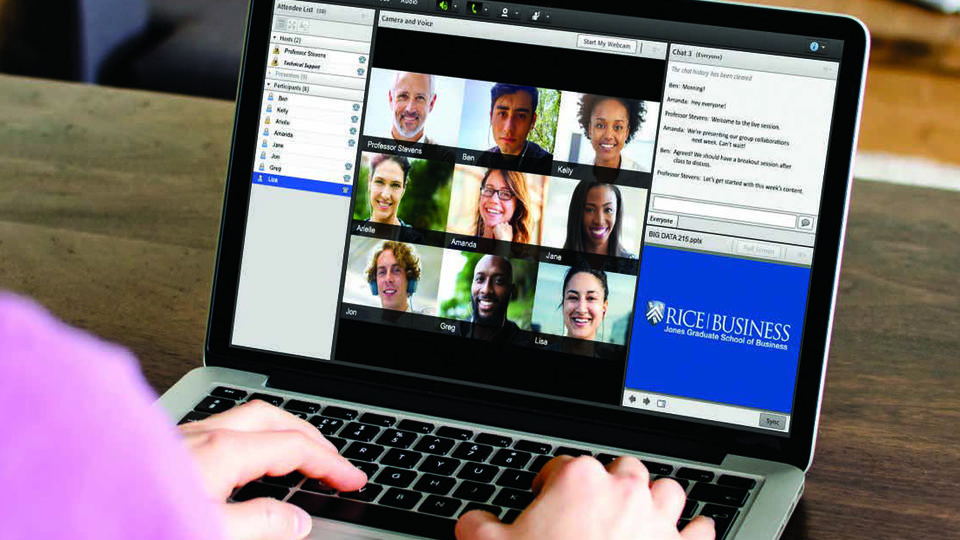
Consumer surveys drive stock prices, research shows
New research co-authored by Vikas Mittal, the J. Hugh Liedtke Professor of Marketing at Rice Business, finds that businesses interested in improving their stock prices should focus on improving customer satisfaction.
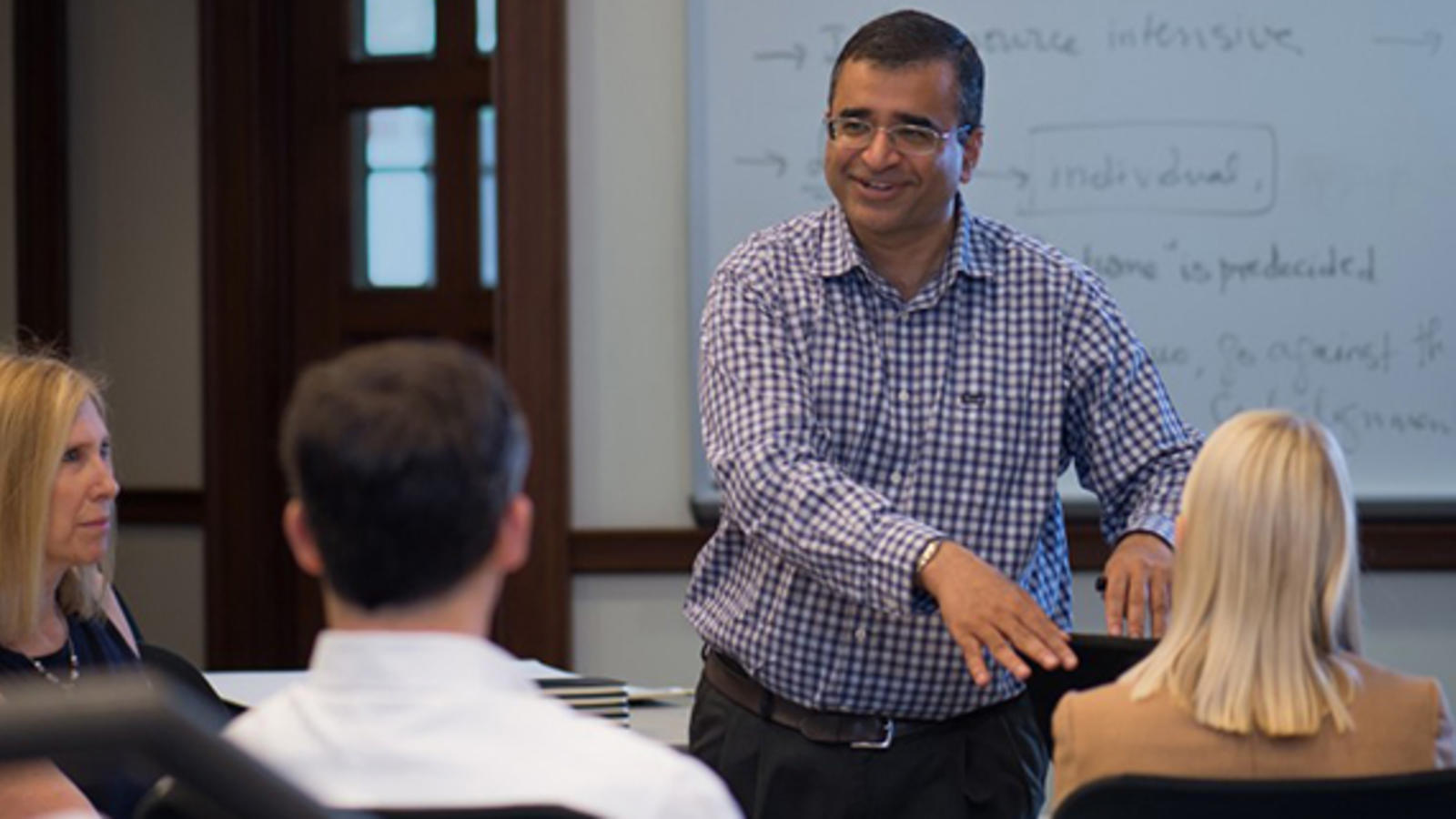
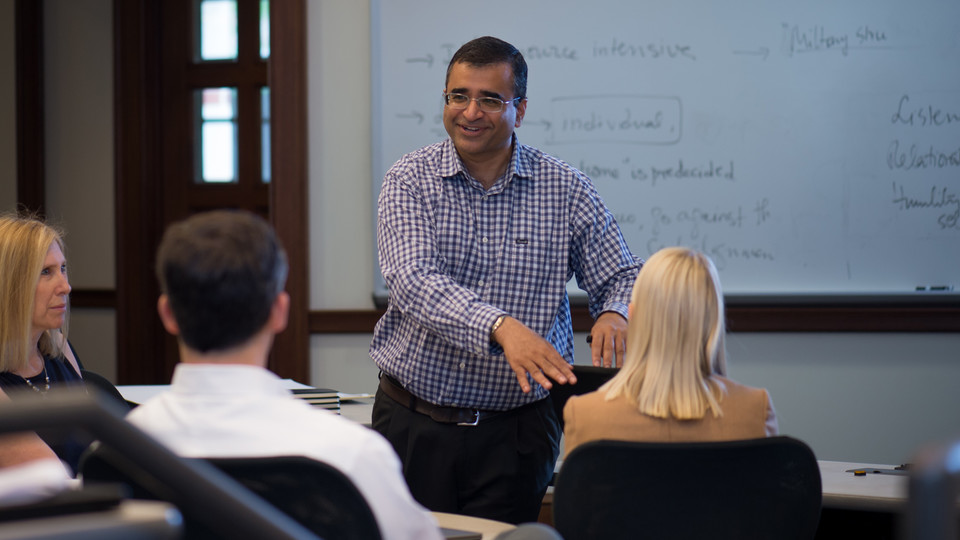
New research co-authored by a Rice University professor of marketing finds that businesses interested in improving their stock prices should focus on improving customer satisfaction.
The study, published in the Journal of Marketing Research, analyzed quarterly data from 273 companies over a 10-year period and found that short interest — a measure of short seller activity — is an important indicator of customer satisfaction.
“Our research finds that customers can move a company’s stock price by expressing their satisfaction or dissatisfaction with a product or service, such as when they fill out a feedback survey,” said Vikas Mittal, the J. Hugh Liedtke Professor of Marketing at Rice’s Jones Graduate School of Business.
“Professional investors or short sellers use customer satisfaction survey data to bet on companies’ stock,” he said. “When customers are dissatisfied with a company, short sellers bet against the company, which drives down a company’s stock price. Short sellers avoid betting against a company with satisfied customers, and this increases the company’s stock price,” he said.
Consumers give negative experiences more weight than positive experiences, wrote Mittal and co-authors Ashwin Malshe, an assistant professor of marketing at the University of Texas at San Antonio, and Anatoli Colicev, an assistant professor of marketing at Bocconi University in Milan. They also found that dissatisfaction is more than twice as a strong a driver of stock prices as satisfaction.
“A one-unit increase in customer satisfaction is associated with a .56 percentage point increase in abnormal stock returns, while a one-unit increase in customer dissatisfaction is associated with a 1.34 percentage point decrease in abnormal stock returns,” according to the study.
The authors argue that short sellers therefore act as a conduit between customers and stock returns, as investors monitor short selling activity when making decisions.
“The results are the first demonstration showing how customers affect board room decisions, and dissatisfied customers are a key source of stock price declines” Mittal said. “Today, many firms base executive compensation on improving customer satisfaction. Our results show that companies should also base executive compensation on reducing customer dissatisfaction, as we’ve learned reducing customer dissatisfaction is not the mirror opposite of increasing customer satisfaction.”
“Potentially, our results provide a very persuasive argument to board members of public companies aiming to maintain and increase investments in customer satisfaction,” according to the paper. “In this way, our work also links the customer satisfaction literature to the extensive research in finance, showing that short sellers are a crucial class of investors who affect the behavior of the stock market.”
You May Also Like

Rice University’s Jesse H. Jones Graduate School of Business today announced the launch of its Graduate Certificate in Healthcare Management program, a 10-month, credit-bearing professional credential designed for current and aspiring leaders seeking deep expertise in the business of healthcare.
